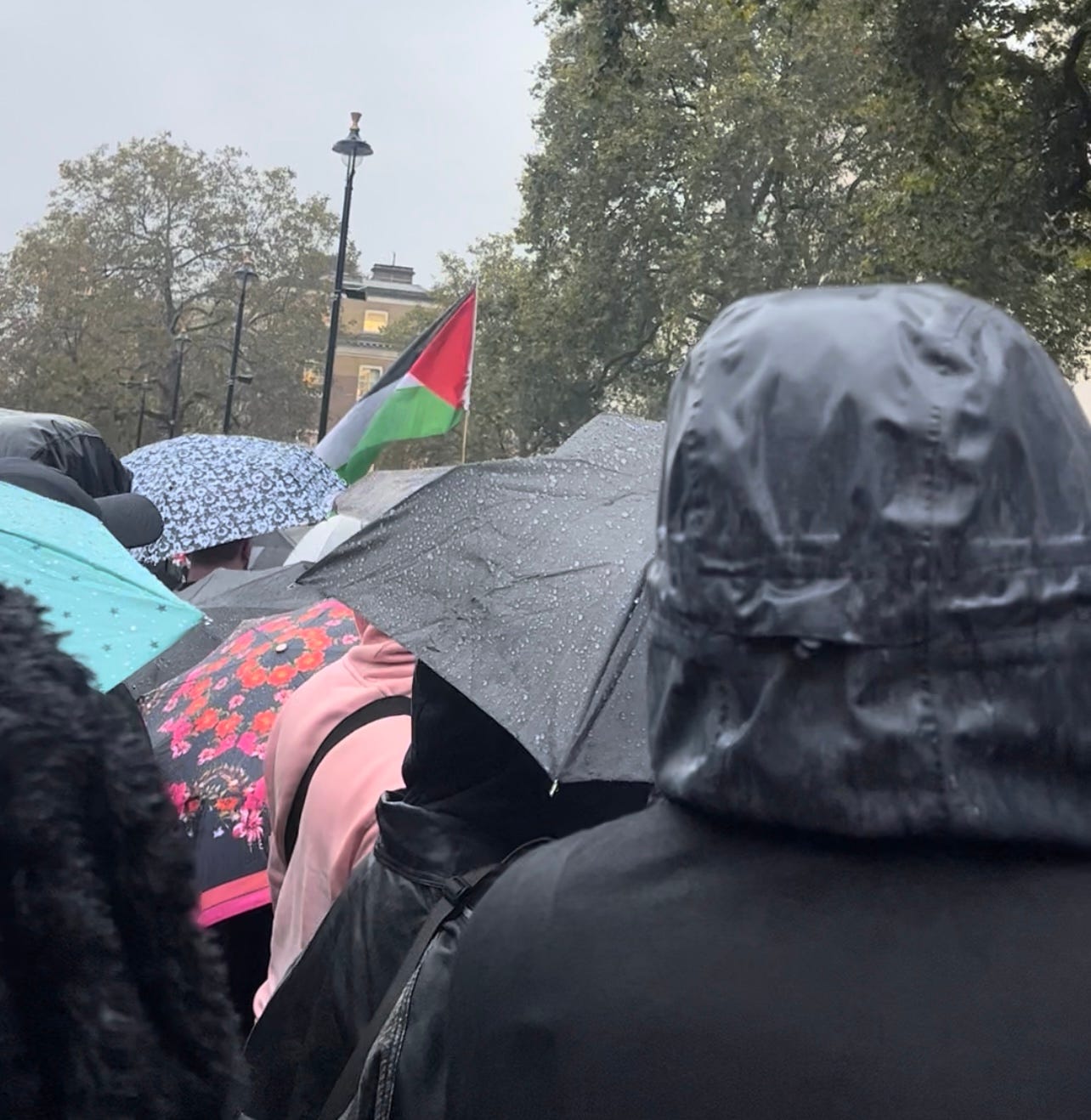It rained last Saturday. But more than 300,000 of us stood outside – some had the fortunate foresight to bring an umbrella, while others braved unrelenting rain for hours, watching it wash away the vibrant hues of placards for Palestine. There are worse things falling from the sky. Come rain or shine, we, the people, will always stand with our brothers and sisters in Palestine.
In front of me, I saw a mother ushering her children forward while avoiding the edges of umbrellas and signs calling for the freedom of Palestinians and for a ceasefire to end all the violence. 'It's raining,' she pointed out to her kids. 'It's a blessing from Allah, your duas (prayers) will get answered, so make extra dua for Palestine.' I thought the same thing.
In Islam, and in Judaism and Christianity, as I understand it, rain is a blessing from God. When it rains, the means of goodness are abundant, and it is thought to be a time when duas will be answered. Prophet Muhammad (blessings and peace of Allah be upon him) said: 'Two duas are not rejected: dua at the time of the call to prayer and dua at the time of rain.'
Like me, thousands of Muslims peacefully marching for Palestine would have been making dua for those killed in Gaza, those who survive without family and loved ones, without homes, peers, communities. I imagine non-Muslims with different faiths are also praying for Palestine. Sometimes, it's all you can do.
Duas are one of our most powerful instruments. They're a testament to Allah's powers and capability. I do not shy away from asking anything of God. Who better to ask than the Supreme Creator of all things? I remember the words in Surah Yasin in which it says: 'when He intends a thing, it is only that He says to it, "Be!" and it is!' Subhanallah.
Duaa in itself is an act of worship. And it isn't a selfish endeavour. There's also a communal love when it comes to making duas. We don't just pray for ourselves; we pray for our families, friends, the ummah (Muslim community), those facing hardships, oppressions. We even make dua for strangers. I've seen social media call-outs from people performing Hajj and Umrah, asking people to share specific duas they want to be made on their behalf. Some people even make Excel spreadsheets to allow those wanting to request duas to add theirs.
Duas are quiet acknowledgments that most things are out of our control and only Allah can decree the best course of action, even if it doesn't feel like the best thing at the time. Through them, we affirm that only God has the power to grant or deny our wishes, desires, hopes, and ambitions.
Between Muslims, asking someone to make dua has become a sign-off, a mutual understanding that only Allah can alleviate our daily struggles and grant us better things. We say 'make dua for my parents' or 'for me to get married' or 'for me to get good grades/outcomes' or 'for good health'. And we go home, sit on our prayer mats after prostrating to God, cupping our raised hands in front of us, remembering the duas of our loved ones. Is there a better love language than that of dua?
But just because we can sit at home and make dua doesn't mean it is our only defence against hardship, oppression, and tyranny. We should tie our proverbial camels, meaning to do whatever we have to do first and then leave the rest to Allah. As people with various privileges, there are many other things we can do to help the helpless alongside making dua: show up to protests, email our MPs, sign petitions, donate to trusted sources, mount pressure on those with more power, share resources.
May Allah accept our duas and efforts. Ameen.
Allahumma aslih ahwaalal-muslimeena fi filisteen, Allahumma aslih ahwaalal-muslimeena fi filisteena wa fi kulli makaanin ya dhul-jalali wal-ikraam.
O Allah! Rectify the affairs of the Muslims in Palestine. O Allah! Rectify the affairs of the Muslims in Palestine and in every place, O Lord of Majesty and Bounty.
Allahumma aslih Ummata Muhammad. Allahumma farrij ‘an Ummati Muhammad. AllahummaRham Ummata Muhammad [sallAllahu alayhi wasalam].
“O Allah! Improve (help) the state of the Ummah of Muhammad. O Allah! Grant ease to the Ummah of Muhammad. O Allah! Have mercy on the Ummah of Muhammad.”
When you make dua, try to structure it in a way where you praise Allah, invoking any of His names, send blessings and salutations upon our Prophet (PBUH), then ask for forgiveness (invoke names such as Al-Ghafur, Al-Ghufar, Most-Forgiving, Coverer of Sins, and Al-Afuww, the Pardoner). Make your personal duas now, and then end it with the same praise and calls for forgiveness.





Beautiful to read. Love how you entwine justice, human experience, insight and education into Islam and the Muslim community, and superb writing skills that allow the entire piece to flow effortlessly and with perfect rhythm.
Thank you for your comforting words ❤️